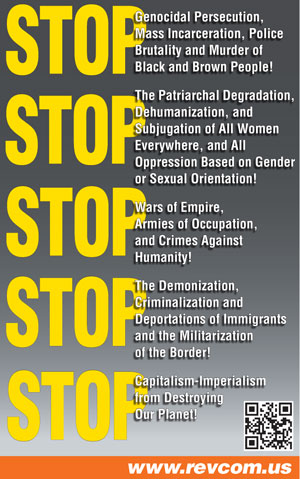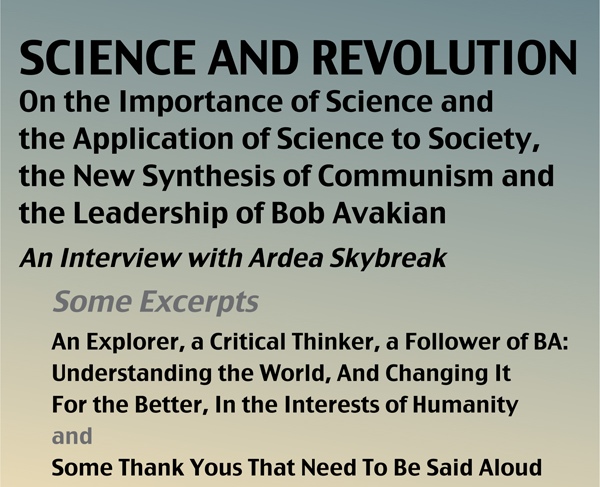Communism or Nationalism?
Report of Discussion of Polemic Written by Comrades in Mexico
April 20, 2015 | Revolution Newspaper | revcom.us
From a reader:
Some regular readers of Revolución with close ties to Mexico got together to discuss in Spanish the polemic “Communism or Nationalism?” by the Organización Comunista Revolucionaria de México. Some of us had read a lot of BA’s (Bob Avakian’s) work, some almost none; and there were wide differences in reading level. The polemic and our discussion overall sharpened and concretized our understanding of the difference between nationalism and communism, why the national bourgeoisie is incapable of leading the revolution, and why it is so critical in the current international situation, and the crisis in Mexico in particular, for this communist line to spread and gain material force.
To start off, we set the context of why it is particularly urgent now to have revolutionary communist leadership, given the intensification of the crisis in Mexico. One person analyzed in considerable detail why the situation in Mexico is much more critical now: anger over neoliberal reforms of the oil and other state industries, education, etc.; massive uprisings among students and professional and middle class sectors, the role of independent journalists. Ayotzinapa students and parents threw stones at Cuauhtémoc Cárdenas—they don’t believe in the electoral parties. He mentioned that an immigrant co-worker joined a march of Black people against police murder as it passed him on the street, as an example of how the uprisings in the U.S. are affecting immigrants. It was also brought in that there are many U.S.-born students who are going to school in Mexico; some are involved in the student struggles around Ayotzinapa, and this is also a factor for spreading ferment back and forth.
We also touched on how certain forms of nationalism that we run into are holding people back from taking up revolutionary thought and struggle. For example, at a protest one man told me that Marxism is a European ideology, and that in Latin America we have our own ideology, Socialism of the 21st Century, with roots in indigenous culture and social organization; that it is racist to denigrate indigenous forms of socialism. For this reason he was telling people around him not to read Revolución! In fact, “Socialism of the 21st Century” is demagogy in the mouths of people like the late president Hugo Chavez of Venezuela. We dug into the Raymond Lotta article which had just come out, [“La recolonización en nombre de la normalización, lo que motiva la reanudación de las relaciones diplomáticas entre Estados Unidos y Cuba,”1] to flesh out why bourgeois nationalism cannot and does not lead to liberation of oppressed countries from the imperialist market and investment relations.
One person brought up how the Mexican government pressured peasants to plant coffee for the international market instead of maize for food. Then coffee prices plummeted, and the peasants are ruined: in debt and without corn. Development in the context of an imperialist-dominated world ends up causing more suffering, but the national capitalists fear unleashing the people to make revolution; so on their own, the most they do is mount a half-hearted negotiation for a larger share of the spoils of oppressing their “own” people. One person volunteered to do further study on the ideology and practice of Socialism of the 21st Century for further discussion. We should also understand how to defend and build off positive aspects of indigenous culture at the same time as we fight for an understanding that communism is an internationalist ideology representing the international proletariat.
I found in the course of summing up the discussion that I had brought a lot of nationalist and determinist baggage into it; that is, my attitude toward nationalist ideas and people was that they just are, they don’t change. The discussion jumped off around a comment made by one of the participants a couple of months prior, that nationalism is good and the strongest or the majority forces fighting against the system are nationalist. Another comrade argued that nationalism is a bourgeois ideology, therefore it is bad, and communists should struggle against it; at the same time, he pointed out, we do need to unite with revolutionary nationalists like Cornel West. My response was that the point isn’t that nationalism is good or bad, but rather that nationalists should fight imperialism and not cave in to it (which on their own they tend to do)—communists need to unite with such nationalists but we should not confuse communism with nationalism. There’s some truth to this, but also a tendency to see things as static.
Looking back on this, I think that I was digging up an old (always incorrect) interpretation of a United Front against Imperialism line in which communists lead (how? by organizing it and declaring their leadership?); nationalists are included, and we all march against the imperialists in a static formation, each in their assigned spot, as it were. Rather, the way communists lead is by struggling for internationalism at the same time as we struggle to make the struggle against imperialism as fierce, massive, and inclusive as it needs to be.
Another weakness was that, while we did need to clarify and concretize why nationalism as a leading ideology cannot achieve independence from imperialism, to concentrate on that tends to make such independence too much of a focus and goal, rather than the achievement of communism, the elimination of all oppression on a world scale. I also think that we didn’t fully get the key point that communist internationalism is not simply a good, moral position but rather, since it is based on the scientific reality that the communist revolution is a world process, it is also the ideology most capable of fully recognizing and seizing on the revolutionary opportunities that exist on a world scale.
As the polemic concludes, “El comunismo, en cambio, al comprender científicamente la interrelación dialéctica entre el proceso mundial y la lucha revolucionaria en cada país, y al identificar acertadamente la base material en las contradicciones del mismo sistema capitalista-imperialista de las que surgen tanto la necesidad como la posibilidad real de su transformación revolucionaria hacia el comunismo, puede y necesita guiar el proceso de abrir paso por medio de una difícil y tortuosa lucha, a un futuro muy distinto y mucho mejor.”2

I found it quite difficult to expand the lens in concrete terms to turn on its head the example that Mao puts forward of how the egg is a metaphor for internal contradictions within a particular country that make revolution possible, while the hen or incubator represents developments on a world scale, i.e. external contradictions, provide the conditions under which the internal contradictions play out. Mao’s example was clear enough. (Without warmth, the egg won’t hatch, but no matter how long the hen sits on a stone, it will not hatch.) But when I tried to “zoom out” and explain the philosophical point made by Avakian elsewhere and applied in the polemic, that the same thing is true on a world scale, i.e., the key contradictions of the epoch are internal to the world process of revolution; what is an external contradiction in the context of the one country is internal in the context of the world process, well, it just became too abstract. “What does the egg stand for?” someone asked, and I said, “It’s the revolution trying to be born.” Trying to build on the egg metaphor, I said, imagine now that, we’re not looking just at the hen’s nest, we draw back and see that the foxes are surrounding the henhouse; that’s a bigger and more important contradiction that will impact the egg/revolution. Most of the folks in attendance have roots in the countryside, and they immediately cast themselves in the role of the farmer guarding the henhouse, and the philosophic point, that a contradiction can be external in one context and internal in another, got lost and tangled up in the foxes! This is what I call beating the egg metaphor to death! I understand why the polemic must deal with the egg metaphor, but it does seem to inherently limit to a small scale.
It was more helpful to delve into the example of a human body. Each cell of the body, each organ has its own internal processes which make it live, but the body as a whole is a single unit. What affects that unit affects each part of the body. So it is with the world revolution. If a doctor is single-mindedly focused on a single organ, he or she will fail to understand even that organ; if we only analyze what is happening in a country in isolation from its world context, we will fail to seize the opportunities. Here people spoke to the effects of Ferguson and the Black Lives Matter struggle on people in Mexico and immigrants from Mexico, and also the impact of the Ayotzinapa struggle on immigrants and on people in the U.S. People see that others like them are rising up and exposing horrors that they have suffered in silence for so many generations, and it inspires and strengthens them.
All the participants felt that there is a lot in this polemic for us to dig into and grasp more concretely, and I encourage other people to do the same. One person spoke for all of us when he summed up, “Sinceramente quiero dar un saludo a los camaradas de México por esta polémica porque representa un salto muy grande que han dado en entender la nueva síntesis del comunismo de Bob Avakian y lo que significa para los pueblos del mundo.” (“I want to send a heartfelt greeting to the comrades in Mexico for this polemic because it represents a very big leap which they have made in understanding Bob Avakian’s new synthesis of communism and what it means for the peoples of the world.”)
“Re-Colonization in the Name of Normalization: Behind the Re-Establishment of U.S.-Cuba Diplomatic Relations” [back]
“Communism, on the contrary, by understanding scientifically the dialectical interrelation between the world process and the revolutionary struggle in each country and by correctly identifying the material basis in the contradictions of the capitalist-imperialist system itself that provide both the need and the real possibility of its revolutionary transformation toward communism, can and needs to guide the process of opening up the road by means of a difficult and tortuous struggle to a very different and much better future.” [back]
Volunteers Needed... for revcom.us and Revolution
If you like this article, subscribe, donate to and sustain Revolution newspaper.









